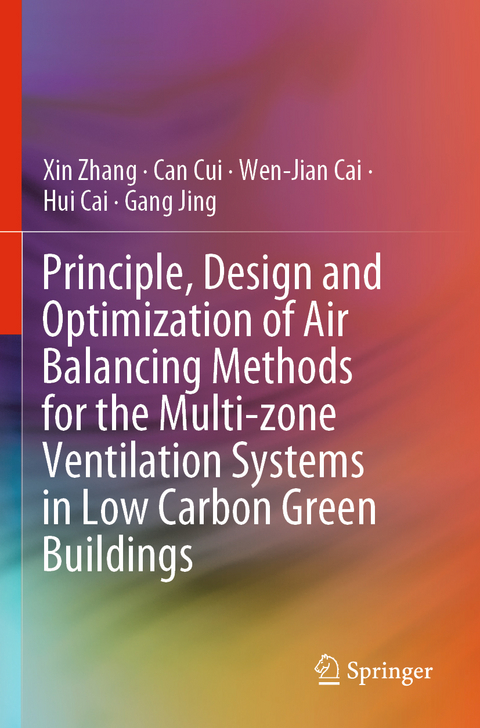
Principle, Design and Optimization of Air Balancing Methods for the Multi-zone Ventilation Systems in Low Carbon Green Buildings
Springer Verlag, Singapore
978-981-19-7093-1 (ISBN)
Xin Zhang received the Ph.D. degree in Automatic Control and Systems Engineering from the University of Sheffield, U.K., in 2016 and the Ph.D. degree in Electronic and Electrical Engineering from Nanjing University of Aeronautics and Astronautics, China, in 2014. From February 2014 to December 2016, he was Research Associate with the University of Sheffield. From January 2017 to September 2017, he was Postdoctoral Research Fellow at the City University of Hong Kong. From September 2017 to August 2020, he was Assistant Professor of Power Engineering with the School of Electrical and Electronic Engineering, Nanyang Technological University, Singapore. Currently, he is Full Professor at Zhejiang University. He is generally interested in power electronics, power systems, and advanced control theory, together with their applications in various sectors. He has received the Highly Prestigious Chinese National Award for Outstanding Students Aboard in 2016. He is Associate Editor of 8 SCIjournals and transactions, such as IEEE TIE/JESTPE/OJPE Access and IET Power Electronics. Cui Can received bachelor's degree in Control Science and Engineering (Automation) from Shandong University, China, in 2014, and Ph.D. degree in Electrical and Electronic Engineering from Nanyang Technological University, Singapore, in 2019. She was Research Fellow at the Energy Research Institute @NTU from 2019 to 2020. Currently, she is Associate Professor at Ocean University of China. She is interested in advanced control, data-driven technology and the air balancing control in HVAC system. Prof Cai Wenjian is currently in the School of EEE, Nanyang Technological University, since 1999. He received his B. Eng., M. Eng., and Ph.D. from the Department of Precision Instrumentation Engineering, Department of Control Engineering, Harbin Institute of Technology, P. R. China, and Department of Electrical Engineering, Oakland University, U. S. A.,in 1980, 1983 and 1992, respectively. He has more than twenty years of industry and research experience in the areas of mechanical design, system modelling and simulation, energy and environmental system automation and process control. He participated in many industry-related research projects and published more than one hundred technical papers, three books, two patents and received three national awards. He has been often invited as a technical committee member or referee and reviewer for a number of premier conferences and journals, including Journal of Process Control, Energy and Management, etc. He is Member of IEEE. Cai Hui received the B.S.E.E. and Ph.D. degrees from Zhejiang University, Hangzhou, China, in 2002 and 2008, respectively. He is Full Professor at the College of Mechanical and Electrical Engineering of China Jiliang University, Hangzhou, China. Currently, he is Visiting Research Fellow at the School of Electrical and Electronic Engineering of Nanyang Technological University. His current research interests include power converter systems, new energy power generation, electrical parameters measurement and big data analysis, advanced control theory. Jing Gang received bachelor's degree in Electrical and Electronic Engineering from Harbin University of Science and Technology, Harbin, China, in 2000, and Ph.D. degree in Control Science and Engineering from Shandong University, Jinan, China, in 2013. Currently, he works as Lecturer at Shandong Jiaotong University. He is interested in zero energy building.
Introduction of the Air Balancing Technology.- A Hierarchical Air Balancing Method via PID Control.- A Gradient-Based Online Adaptive Air Balancing Method.- A Distributed Cooperative Control-based Air Balancing Method.- An Air Balancing Method Using Support Vector Machine.- An Air Balancing Method Using Multi-layer Feed Forward Network.- An Air Balancing Method by A Full Data-Driven Duct System Model.- An Air Balancing with Optimal Pressure Set-point for Minimized Energy Consumption.
| Erscheinungsdatum | 20.10.2023 |
|---|---|
| Zusatzinfo | 91 Illustrations, color; 10 Illustrations, black and white; XIV, 157 p. 101 illus., 91 illus. in color. |
| Verlagsort | Singapore |
| Sprache | englisch |
| Maße | 155 x 235 mm |
| Themenwelt | Informatik ► Theorie / Studium ► Künstliche Intelligenz / Robotik |
| Technik ► Architektur | |
| Technik ► Bauwesen | |
| Technik ► Elektrotechnik / Energietechnik | |
| Schlagworte | Advanced Control • Air Balancing • Data-driven • Energy Saving • Heating, Ventilation, and Air Conditioning (HVAC) • Zero Energy Building |
| ISBN-10 | 981-19-7093-9 / 9811970939 |
| ISBN-13 | 978-981-19-7093-1 / 9789811970931 |
| Zustand | Neuware |
| Informationen gemäß Produktsicherheitsverordnung (GPSR) | |
| Haben Sie eine Frage zum Produkt? |
aus dem Bereich


